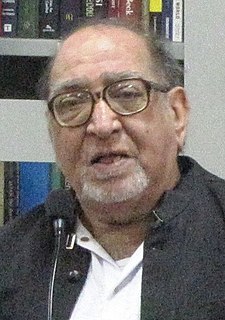A Quote by Pankaj Mishra
As an Indian, you feel easily connected with certain histories in places like Indonesia, where one sees, because of the presence of the Hindu-Buddhist past, Hindus still living there or Muslims performing rituals that are instantly familiar.
Related Quotes
When I am talking to people from Germany, we should know that there are certain things and certain histories that are very important for people. If you look at all the Muslims living in the West, they didn't react in a violent way. They don't like what they saw but they are citizens like you and me and they look at it and say: "This is a silly video but we are not going to react."
Once started, religious strife has a tendency to go on and on - to become permanent feuds. Today we see such intractable inter-religious wars in Northern Ireland, between Jews and Muslims and Christians in Palestine, Hindus and Muslims in South Asia and in many other places. Attempts to bring about peace have failed again and again. Always the extremist elements invoking past injustices, imagined or real, will succeed in torpedoing the peace efforts and bringing about another bout of hostility.
The motion of the stars calculated by the Hindus before some 4500 years vary not even a single minute from the tables of Cassine and Meyer (used in the 19-th century). The Indian tables give the same annual variation of the moon as the discovered by Tycho Brahe - a variation unknown to the school of Alexandria and also to the Arabs who followed the calculations of the school ... The Hindu systems of astronomy are by far the oldest and that from which the Egyptians, Greek, Romans and - even the Jews derived from the Hindus their knowledge.
I think the Greeks first took astrology to India and took from the Hindus the science of astronomy and carried it back with them from Europe. Because in India you will find old altars made according to a certain geometrical plan, and certain things had to be done when the stars were in certain positions, therefore I think the Greeks gave the Hindus astrology, and the Hindus gave them astronomy.
The Sufi saint Mazhar Jaan Jana of 18th century Delhi believed that the Quran condemns bowing before deities because in pre-Islamic idol worship stones were considered god. But Hindus pray to god through that idol, which is a reflection of god. In Vedas god is nirguna and nirankara, that is, he has no attributes and no shape, that is the real belief of Hindus. As Muslims visit graves, so Hindus worship idols.





































